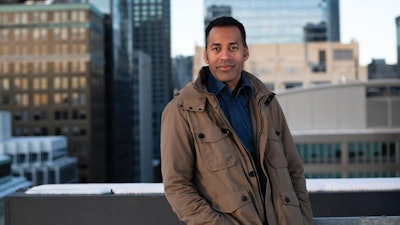
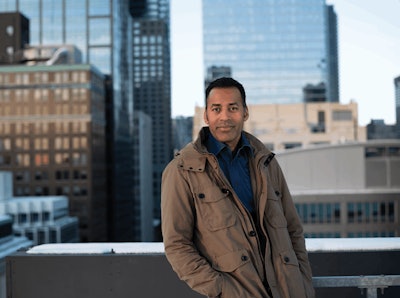
Six years ago, overseeing a Canadian cannabis company wasn’t part of Vinay Tolia’s game plan. He was operating a Chicago hedge fund when Illinois legalized medical cannabis in 2013. Fascination with the business intrigued Tolia and his hedge fund partners, and they made some early investments outside of their hedge fund while at the same time deciphering how the cannabis industry works. “I learned very quickly just how difficult this plant is to grow well,” Tolia recalls.
Tolia and his partners met a team in Canada looking for investors to support their newly built cultivation business. By that point, Tolia had overcome the cannabis learning curve, and he was impressed with what the team had accomplished. “We had just never seen this level of cannabis-specific cultivation and construction and expertise,” he says. “We said we want this to be our bet in cannabis, and we founded Flowr.” That was 2016. Tolia eventually became so involved in the day-to-day that he was named CEO in 2018.
In Tolia’s first year as CEO, Flowr has announced several significant transactions, including:
- A supply agreement with Canadian pharmacy chain Shoppers Drug Mart
- An R&D alliance with Hawthorne Canada, a subsidiary of Scotts Miracle-Gro’s Hawthorne Gardening Co.
- Entry into European and Australian markets with the acquisition of Holigen Holdings Ltd.
Cannabis Business Times spoke with Tolia to discuss these advancements, competition and the company’s strategic goals.

Jolene Hansen: What differentiates Flowr from your competitors—in cultivation and management?
Vinay Tolia: What makes us different on the cultivation side is the experience here. We have folks who have been designing, building and running cultivation facilities in Canada since the [Marihuana Medical Access Regulations were implemented in 2001 for personal medical use].
Essentially, you have a team of people who are used to operating in a federally regulated environment for years and years and have built a ton of different facilities and made iterations to design. So on the cultivation side, we really do have a team that’s second to none. Then we have a management team that’s the best of both worlds, with finance professionals and some [who have] CPG (consumer packaged goods) experience. We have unique skill sets that combine button-down traditional corporate culture with really specific cannabis expertise, so we’re not one or the other. We’re a hybrid of both.
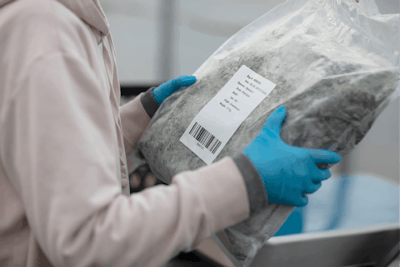
Hansen: You’ve targeted the premium segment of the market. What’s the strategy behind that focus?
Tolia: The important thing to remember is that, unlike traditional CPG businesses, the premium flower market—especially for recreational users—is not a niche market.
Premium cannabis is the heart of the market. People don’t walk into a dispensary and say, “I have $100. What’s the most amount of product I can buy?” People always say, “I have $100. What’s the best product I can buy?”
Hansen: In the past, you’ve spoken about competing with the illicit market on quality. Do you feel most legal producers are not competitive in that sense?
Tolia: Yes, absolutely. You hear a lot here in Canada and in California where people say the illicit market is still booming because of price. I disagree. I think the illicit market is still booming because they offer a [better overall] product that has a better sensory experience than the legal market.
When I say we have to compete on quality, that’s what I mean. We have to produce a product that smells and tastes as good, if not better, than the stuff you can get on the illicit market. I think in time, when the legal market can compete on taste and quality with the illicit market, people will opt to pay more for the legal products because you know it comes with that degree of confidence that it’s gone through health and safety testing.
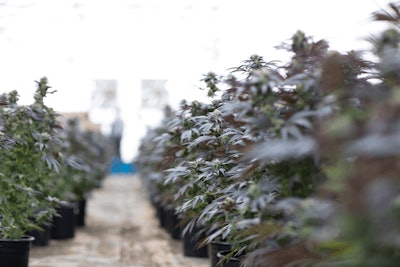
Hansen: Your indoor facilities consist of relatively small grow rooms. Why that approach?
Tolia: You need small grow rooms because, first of all, you need to control every single aspect of the environment. Second, in between harvests, you need to completely decontaminate each grow room. If there is any kind of issue, one, it is contained to that grow room and, two, it’ll be gone the next harvest.
Hansen: You’ve expanded into greenhouse and outdoor cultivation with Flowr Forest at your Kelowna campus. How does that fit in?
Tolia: Our flagship facility is Kelowna 1, our purpose-built indoor facility focused on that high-quality flower. Then we have a low-CapEx (capital expense) greenhouse facility and outdoor grow across the street. When I say low-CapEx greenhouse, we’re talking poly-film greenhouses here; we’re not talking about the fancy glass things. You might say, “Hey, doesn’t that go against your thesis?” I’ll explain why it doesn’t.
It’s because we think there’s two ends of the market. If you think about an hourglass, you have one end of the hourglass that’s premium flower for the smokable market. That’s really important for the rec market. That has to be grown in a controlled indoor facility. Then, on the other end of the hourglass, you have product that’s destined for extraction, that’s going to go into vapes, beverages, edibles. That is all about scale and efficiency. If you think about the hourglass, we have the indoor facility, the top end of the hourglass. Then we have the low-CapEx greenhouse and outdoor facility, that’s the bottom end of the hourglass, so it’s all about efficiency and scale and a product heading for extraction.
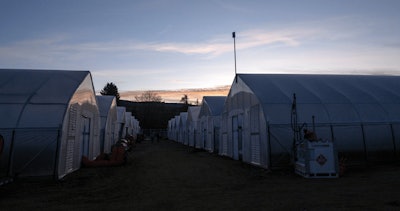
Hansen: Let’s talk partnerships and acquisitions. Tell us about your relationship with Shoppers Drug Mart.
Tolia: We formed a partnership with them where we’re only selling our medical product in Canada through Shoppers. The reason we did that is because we think Shoppers, in time, will be the dominant player in Canadian cannabis. That’s [more than] 1,300 pharmacies across the country. In time, I think the product will be treated more and more like a regular pharmaceutical, and there’s no better partner to have in Canada than Shoppers.
Hansen: How did your partnership with Hawthorne Canada come about, and what do both companies gain?
Tolia: Hawthorne is essentially paying for a [50,000-square-foot] R&D facility to be built on our campus in Kelowna. Because they’re a publicly listed company in the U.S., they can’t touch the plant. They needed to do testing on their products, so they needed a Canadian partner to do this with. What this does for us is not only strengthen our partnership with Scotts [Miracle-Gro, Hawthorne’s parent company] and allow us to potentially work on other exciting things with them, but it allows us to have an R&D facility on our campus and allows us to really stay at the cutting edge of cultivation technology and IP (intellectual property).
Hansen: The Holigen acquisition extends your reach into Portugal and Australia. What are your plans there?
Tolia: We’re super excited about that. Just to back up, there are different product requirements for different markets. What I explained earlier is our Canadian recreational focus with the premium flower for the rec market. But when you go to Europe or ... Australia, that’s a medical-only market. [Editor’s note: Sydney passed a measure in September 2019 to legalize adult-use possession.]
The great thing about Holigen is they are essentially set up as a pharmaceutical company. They have a deep knowledge in GMP (Good Manufacturing Practice) and construction, and they have a ton of pharma knowledge. What they didn’t have was that cannabis cultivation knowledge. So, this was a partnership very much like 1+1=3.
Our license in Portugal … is product that will be destined for extraction that will be grown very efficiently. [It’s a] 7-million-square-foot outdoor cultivation license in an agricultural region in Portugal. We’ll be able to grow product very, very efficiently, extract it right into oils, and send it to the medicinal markets in Europe and Australia. We feel that with our cultivation IP and knowledge, and these assets and this team, we’ll be able to supply each of those markets with the ideal product.
[In Australia,] we have a facility that’s already GMP-licensed, and we’re hoping to have plants growing there in the next year. In Portugal, the facilities are already up and running, and [had initial harvests out of both Sintra (indoor) and Aljustrel (outdoor) in late 2019].
Hansen: We hear a lot about Portugal. How does it compare to other European countries? Is the market more advanced?
Tolia: When it comes to the actual size of the [Portugal] market internally, no. ... But the government body there has been really forward-looking, and they’ve been setting themselves up as a hub for all of Europe. The nice thing about the EU is once you’re in the EU, you can move around the EU countries basically frictionless. (Editor’s note: In a follow-up email, Thierry Elmaleh, Flowr’s head of capital markets, clarified that once Flowr has GMP certification, the company will be in position to export to other EU countries where medical cannabis is legal). For example, if you want to sell a product into Germany, you don’t have to be in Germany. You can be anywhere in the EU and get product in there. Now, who knows what the future holds. If countries want to get protectionist, they can do that, but they can’t get protectionist with other countries in the EU.
Hansen: As you move into these markets, what are some of the greatest challenges you see associated with international expansion?
Tolia: There are a lot of regulatory hurdles. Each market is highly individualized, highly tailored to whatever that specific market needs. A big part of it is just educating the market. We’re going into these markets in Europe and Australia that are really just getting started. A big part of selling product there is educating patients and educating doctors. There’s a ton of challenges, but I would say just the regulatory, distribution and education are the biggest.























